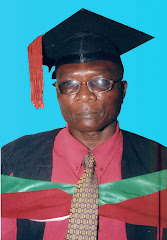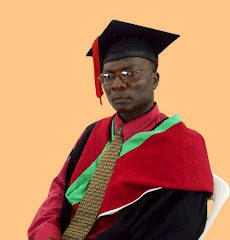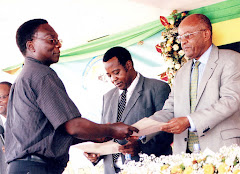Monday, August 31, 2015
Imported frozen fish dominates Magogoni International market in Dar
THE Magogoni International fish market in Dar es
Salaam which initially was designed to promote small scale local fish traders is
now dominated by cheap imported frozen fish popularly known as ‘Vibua Kamongo’
following low supply of the fish products currently facing the market, the Guardian can report. A spot check at the
market on Wednesday this week can reveal that, the market is now faced with lower
supply of fish products and instead it has been flooded with cheap imported
frozen fish. Traders at the market have attributed the trend which has led to
such a severe scarcity as mainly due to the sea weather change at this period
following the prevailing wind seasons of the year calendar that swipes through
during July and early September months respectively. Speaking in an exclusive
interview, fishers say whenever they set up their fish nets on the sea during
night hours are not settled properly and instead are waved away by water
current an aspect that they end up catching small quantities which cannot
accommodate the demand of consumers. Contacted for comments, the Fish Market
Manager Solomon Mushi who admitted the prevailing situation at his market noted
that, the situation is more aggravated by lack of storage facilities which have
never been installed at the market compound despite promise by the government
after the market was built in 2003 by help of Japanese government. He exclusively
narrated that, the market is running short of fresh fish due to shortage of their
supply as fishers sometimes are scared to catch more fish for fear of incurring
losses in case are left overnight due to lack of storage facilities, and
instead the imported frozen ones helps to subsidize the incurring shortages. Elaborating
on the cheap imported fish, he said that are being imported mostly by
Tanzanians of Arab and Asian origin and some few local traders from Japan, Yemen,
Hong Kong, China and India. These have been licensed by the government through
the ministry of Fisheries. Attributing to the rising trend, the Director in-charge
of Fisheries development in the Ministry of Livestock Development and Fisheries
Hosea Mbilinyi said that, the ministry issues import licenses to fish traders
owing to the shortages of fish products currently produced in the country. He said
on Thursday this week most Tanzanians love fresh fish caught from various
waters in the country, but since their quantities is less to meet the required
demand consumers have no choice except to rely on imported fish which to a
certain advantage are sold at cheapest price rates.
When asked why the
government issues imports licenses to fish traders he noted that, ‘there is no
way to avoid importations owing to the incurring shortages of the fish products
from waters in most parts of the country
which do not cater for the need of consumers in most parts of the country. He
noted that, with the latest statistics made available by the ministry shows
that, the annual production of fish in the country stands at 375.1 million
kilogrammes, out of which about 38.5 million kilogrammes were exported outside
the country. He said there is a steady rate of exportation of fish products
regardless of losses and destruction that occurs in the process. In view of
this an average consumption of individual in the country stands at 7.4
kilogrammes per person per year. This is a very small quantity compared to what
the United Nations Food and Agricultural Organization (FAO) suggests that the
per capital fish consumption for every individual is 18 kilogrammes of fish
product per year. “In order to bridge the existing gap, the government has allowed
importation of fish products in large quantities in order to cater for the need
that is arising now and then”, he said. Citing the fish production rate in the
country, he noted that ‘latest statistics by the ministry shows that a total of
6.6 million kilogrammes of fish were imported into the country. This is
equivalent to 1.9 per cent of the total fish being produced in national waters in
the country. He elaborated reasons that made Tanzania to join World Trade
Organization (WTO) and accepted the protocol
introduced by the organization and the free trade area of the SADC regional
states that one of the reasons is sensitize the existing trade ties between the
countries. He also noted that, Tanzania must accept the importation whatsoever
and has no way to avoid and in case it does. The countries signed in the WTO and
SADC regional states will also be in a position to prevent Tanzania fish
exports an aspect that is likely to ruin national economy. However, he has
assured Tanzanians that the imported frozen fish are safer and fit for human
consumption bearing the fact that, during the importation process, the bulk is
normally inspected by specialized national bodies such as the Tanzania Food and
Drug Authority (TFDA) at every entry points. Other bodies he mentioned are
Tanzania Bureau of Standards (TBS) and the National Atomic Agency whose roles
together is to ensure the quality of fish that had been fished out in a safe
and in a scientific manner to avoid suspicion to consumers. Other government
bodies are TRA and security agencies.
No potentials on gas revenues in Kilwa and Mtwara district councils-Study
HOPES by Tanzanians that revenues out of gas
production would help transform lives of millions of people in the country might
hit a snag after the study has discovered that, the service levy paid is too
minimal compared to other income generating activities in areas where its
production has picked up. The Professor of economy Prosper Ngowi of the
Morogoro based Mzumbe University made a concern yesterday in Dar es Salaam in
his study report when contributing to a debate on a topic titled, “Tanzania’s gas economy: Examining local and
national perspectives” which was presented for discussion at Breakfast
talk organized by Policy Forum held at British Council. In his study report titled,
‘‘Service levy revenue from gas companies in Kilwa and Mtwara District
Councils’ Prof. Ngowi has disclosed that the two districts which are endowed
with natural gas reserves receives lesser amount paid as service levy by
Pan-African Energy Company Ltd and M & P Company. Initially the Pan-African
Energy firm was paying the levy at Ilala District Council in Dar es Salaam
region for reasons that had stated earlier that it was where it is registered,
but later the Ministry of Energy and Minerals ordered the diversion of such
funds to Kilwa district whereby the firm is currently doing its business
activities in gas as in accordance to the Petroleum (Exploration and
Production) Act, 1980. The firm was tasked by the Tanzania Petroleum
Development Corporation (TPDC) to deal with gas business activities in the district
over seven years ago and is required to pay 0.3 percent of the service levy
attained out of the company’s gross annual sales as stipulated in Local
Government Finance Act of 1982. Findings by Professor Ngowi show that, Kilwa
District Council has received a total of Sh. 1.1 billion for the service levy
from the company from April 2012 and July 2014 which is equivalent to the annual
average rate of Sh. 391.1 million. Likewise, study findings at Mtwara District
Council show that during the same trading period, the council received a total
of Sh. 93 million from M and P Company for gas production at Mnazi Bay. This is less compared to other sources of
revenues such as Cashew nuts being the main source of income generating fund for
the people and which has produced a whooping Tsh. 932 million in 2014/15 trading
period alone. Revenue incomes of the same crop as indicated in figures for the
preceding years put in brackets are 2014
(Tshs. 358 million), in 2013 (Tsh. 337 million) and in 2012 (Tsh. 1.1 billion)
whereas in 2011 (Tsh. 450 million) Professor Ngowi noted in his study report
that, other companies which he could not mention re at exploration stage and
that are not allowed to pay gas service levy yet.
However, he further noted
that the Mtwara District Council stands to potentially get huge amount of gas
service levy when mass production starts based on ongoing explorations. Earlier,
discussants over the topic poured much blame to the government when the topic
was put across to the audience for discussion, with some saying that, the
government is not serious and open with the gas business activities and its
ongoing exploration. Contributed in the debate,
Flaviana Charles a Programme officer of the Legal Human Rights Centre (LHRC)
noted that, if Tanzanians citizens would not be careful the same gas will be like
what is still in a nutshell with the minerals such as gold.
Flavian
who is also the Vice-President of Tanganyika Law Society is of the view of the
fact that there is a need to review various gas contracts which might have been
put in place and see if Tanzanians will benefit from the natural rich resource.
Rose
Tesha, a progtramme officer of VSO Tanzania Ltd suggested that, the government
should look at other means to increase revenues and concentrate on small scale
income generating activities rather than giving hopes to achieve benefits on
gas whose destiny is yet to be known among Tanzanians.
A
retired Professor Adolf Mascarenhas of the University of Dar es Salaam has
called on Tanzanians to wake up and see to the production of gas in the country
and have all the details in hands instead of politicizing about the matter
which would later on put a nation in danger. He is of
the opinion that, the politicians and the local people must work together in
close ties to ensure that the natural wealth such as gas is publicly addressed
and not leave the matter for the few to make decisions.
The Managing
Director of the Abnsaf Ltd, Aidan Rukonge said that, the government should not
have concentrated much on exploration and rather it should have put in place strategic
means that could enlighten Tanzanians on the basic use of gas.
A
renowned Engineer Steven Ndazi of Shaloom Engineering Company suggested that,
politicians should get away with the exploration and mining activities of the
underground natural wealth and leave the task to be guided b y experts.
He is
however, on the view of the fact that, the policies that the government has put
in place are likely to spoil the future of Tanzanians as this has been compiled
by politicians who are not knowledgeable with the related gas exploration
activities going on in the country.
CRJE refutes reports of involvement on demolition contract deal
A renowned Chinese construction company based in Dar
es salaam, CRJE (Eat Africa) Ltd a subsidiary company of the China Railway Group
Ltd, has refuted reports of having involved in a contract deal alleged to have
entered with the government of pulling down the 16 storey building that stands
along Indira Gandhi Street in Dar es Salaam. Elaborating the matter the firm’s
Managing Director Hu Bo said in Dar es Salaam on Tuesday this week that, his
company has never signed a contract deal to pull down the defective building
which was commissioned by the government two months ago. He told this blog in
an exclusive interview that, his company had only taken hand in rescuing
survivors who got stacked in a heap of debris of a building that stood opposite
the present one after it had collapsed in March 2013 and killed 36 people on
the spot. His clarification has come about just one week after this paper
carried out a story attributed by the
Ilala Municipal Director that, the firm had pulled out of the contract and that
the municipal council is currently looking for another strategic investor to do
the job. He clarified that his company came for help and did the job
voluntarily in favour of the government following the existing cordial
relations which has long been maintained between Tanzania and China. A tragic incident
occurred two days after a Chinese President Xi-Jinping had ended his State
visit of the country and left for South Africa. He further noted that, when the
information about the collapse of a building reached President jinping while in
South Africa, he called on the Chinese Ambassador in the country Dr. Lu-Yuqing
and ordered him to ensure that the CRJE company should give hand of help to
rescue survivors. On receiving such a message from the Ambassador, he
immediately sent a team of taskforce with
equipment like excavators and dumping trucks who worked tirelessly in
collaboration with the group of Tanzania People’s Defense Forces (TPDF) who
already had reported on the site for three days consecutively. “After the
completion of the work President Jakaya Kikwete issued a certificate of
appreciation to my company for the well done job”, he said while insisting that
is how they had participated in the rescue operation and not in any way
otherwise. The current building together with the collapsed one both are owned
by a Dar es Salaam based business man Raza Huseein Damji with the National
Housing Corporation (NHC) having a 25 percent share in the project and were
both constructed by Lucky Construction Limited. Sou Consult Limited did the
work of structural engineering while NHA Limited was cited as the architects. The
government through the ministry of Lands, Housing and Human Settlements
Development ordered the building be pulled down at a cost of Sh. 1 billion
after building experts discovered that it had developed some internal cracks. The
government had discovered that, the two buildings with different construction
permits had violated the laid down contractual rules and regulations as
stipulated in their contracts whereby the owner erected a 16-storey structure
instead of 10 floors as stipulated in the building permits which had been
issued by Ilala Municipal Council authorities in Dar es Salaam region. The mistake was discovered when the former
building collapsed and during the investigations that lasted for a couple of
one month later, building experts had discovered that the present building had
been constructed at fault and recommended immediate demolition to prevent
further losses.
Saturday, August 29, 2015
59,667 poor families to benefit through Tasaf fund in Kagera region
A Total of 59,667 poor families in seven districts in Kagera region have been set to benefit in a programme aimed to empower poor families coordinated by Tanzania Social Action Fund (TASAF) phase 3 out of the earlier 60,885families already registered. Speaking at the special inauguration meeting of the programme which was held at Uhuru grounds in Bukoba municipal council, Tasaf’ regional Coordinator Efrazi Mkama said that the aim of the programme is to empower poor families financially to reduce the high rates of poverty stricken situation facing them He said the total beneficiaries of the programme in the region is relatively low due to a number of different reasons among them are deaths, immigration while some of them had refused to be registered on beliefs related to witch crafty. He said the programme will run for a period of 10 years and is divided in two phases of 5 years each, the aim of the government is to at least enable the poor families get their daily need and hence alleviate the life standards of the poor people and this will be a continuous process. “This work which has associated the poor community members is not the end as the exercise will continue among the communities so that they benefit”, the regional Tasaf coordinator said. He said the government has disbursed a total of Sh. 2.3 billion which has been paid to the 59,667 poor families which are payments for two months July and August 2015 respectively. Speaking at the inauguration, the Bukoba District Commissioner Jackson Msome, whop represented the Kagera Regional Commissioner John Mongella, called on the people to join hands in the implementation of this programme so that it might become more efficient to the needy people. However, he cautioned people not to accept other people’s ideas who do not want such kind of social development activities such as this one not to happen in their areas and cited reasons that the aim of the government is to upgrade people’s life
Friday, August 28, 2015
PM: Govt looks for the possibility of its Diaspora to vote in general election
PRIME Minister Mizengo Pinda has said that the government is looking for a permanent solution which
would enable Tanzanians living in the diaspora to cast their vote wherever they are during the general elections
of October this year. The PM made a statement on Wednesday this week in Uganda when answering questions
of Tanzanians who lives in Uganda at a luncheon party which they had organized at Serena Hotel in Kasmpala city.
“We as a government we really wanted the process to be completed on time so that all Tanzanians living in the
Diaspora are participating in the general elections, but when our talks with the National Electoral Commission
(NEC) came to discover that it couldn’t be so owing to the fact that, it was impossible to send out of the country
the Voter Registration Machines used for registering people known as Biometric Voter Registration or BVR as the
registration is going on in the country”, he said. He said the government has not yet given up and that he himself is
optimistic that the government would work on it during another general election of 2020.
Tanzania's Prime Minister Mr. Mizengo PindaElaborating on the number of the voters in the country,, the PM clarified that initially the target was to register 24 million voters but
according to the statistics available and experience which was attained within SADC region, the NEC advised
the government to set a target of not exceeding 22 million people. “But as many of you might have heard, before the completion of the registration of the people in Dar es Salaam region alone which was the last in the series of
registration already we had surpassed the earlier target of 24 million voters”, he said. He said this is something to
be proud of because initially the process was marred with a number of discrepancies and many complaints of
people who thought that the exercise could not have been done correctly. The Premier arrived in Uganda on
Wednesday this week at night for a one day visit to represent President Jakaya Kikwete who was invited to
attend the commemoration of the 100 of the Uganda Scouts Association – (USA). The Ugandan President
Yowerti Museveni is the custodian of the party
Subscribe to:
Posts (Atom)












